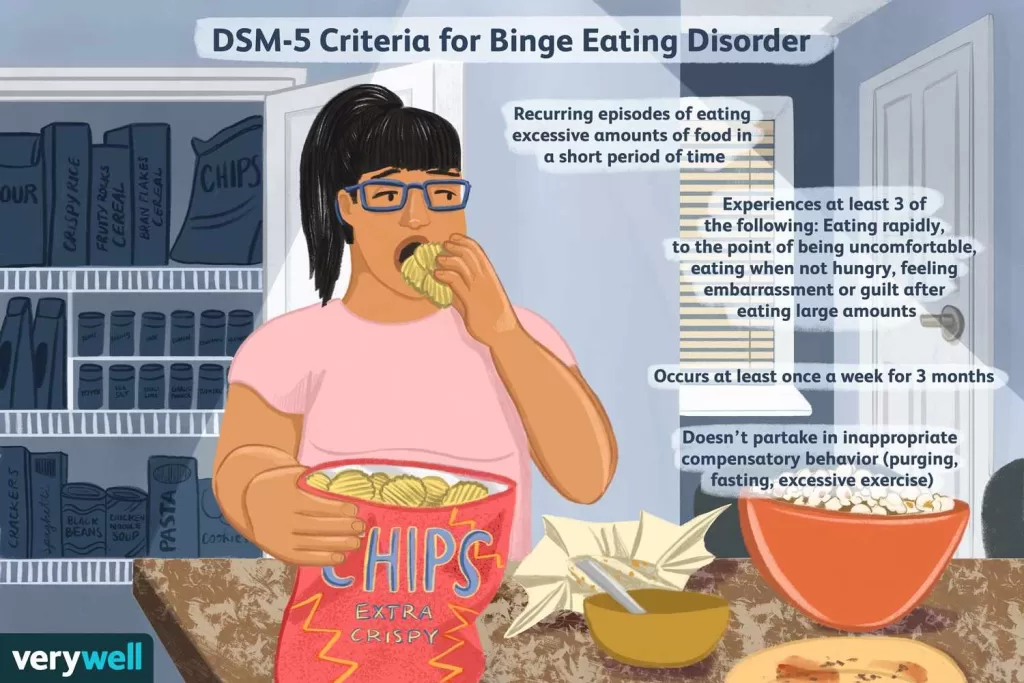Binge Eating Disorder (BED) is a prevalent and serious condition that affects millions of individuals across the United States, with about 3% of adults impacted. Characterized by recurring episodes of excessive food consumption and a profound sense of loss of control, BED stands apart from other eating disorders like bulimia nervosa due to the absence of purging behaviors. The symptoms of binge eating can lead to significant emotional distress, physical discomfort, and a cycle of guilt and shame. Understanding the causes of binge eating, which range from genetic predispositions to psychological factors, is essential for effective intervention. Furthermore, various binge eating treatment options, including Cognitive Behavioral Therapy (CBT for binge eating), provide valuable support for individuals seeking recovery.
Often referred to as compulsive overeating, Binge Eating Disorder manifests through episodes where individuals consume large quantities of food, typically accompanied by feelings of shame and lack of control. This disorder can stem from a variety of influences, including emotional struggles, environmental triggers, and genetic links. Those affected may not only experience the physical symptoms of overeating but also significant psychological impacts, leading to a complex relationship with food. Various approaches to binge eating support, including therapy and medication, offer pathways to recovery, allowing individuals to reclaim their health and well-being. Recognizing the symptoms and understanding the underlying causes of this eating disorder is crucial for fostering healing and promoting healthier eating habits.
Recognizing Binge Eating Disorder Symptoms
Binge Eating Disorder (BED) presents a unique set of symptoms that can significantly impact an individual’s life. One of the most recognizable signs is recurrent episodes of overeating, where individuals consume large quantities of food in a short time, often feeling a complete lack of control. This behavior frequently occurs in isolation, leading to feelings of shame and embarrassment, which can further exacerbate emotional distress. Recognizing these symptoms is crucial for early intervention and effective treatment.
Alongside the recurrent episodes, individuals suffering from BED often report physical discomfort after binge eating, which can lead to significant health issues over time. Emotional distress, including feelings of guilt, disgust, and depression, typically follows these binge episodes. It’s essential to understand that these symptoms are not just a phase but indicate a serious condition that requires attention and support from healthcare professionals.
Frequently Asked Questions
What are the common symptoms of Binge Eating Disorder (BED)?
Common symptoms of Binge Eating Disorder include recurrent episodes of eating large quantities of food in a short time, a feeling of loss of control during these episodes, eating until uncomfortably full, secretive eating, and experiencing feelings of disgust or guilt afterward.
What are the potential causes of Binge Eating Disorder?
The causes of Binge Eating Disorder can include genetic factors, psychological conditions like depression and anxiety, environmental triggers such as stress or trauma, and dietary restrictions that may lead to binge eating as a way to cope with deprivation.
How effective is Cognitive Behavioral Therapy (CBT) for treating Binge Eating Disorder?
Cognitive Behavioral Therapy (CBT) is considered the first-line treatment for Binge Eating Disorder. It effectively helps individuals identify and change negative thought patterns and behaviors related to eating, which can significantly reduce binge eating episodes and improve overall emotional health.
What treatment options are available for Binge Eating Disorder?
Treatment options for Binge Eating Disorder include Cognitive Behavioral Therapy (CBT), medications such as antidepressants and appetite suppressants, nutritional counseling to promote healthier eating habits, and support groups that offer community and shared experiences.
How can individuals find support for Binge Eating Disorder?
Individuals seeking support for Binge Eating Disorder can participate in support groups, consult with healthcare professionals for therapy and nutritional advice, and utilize online resources and self-assessment tools to better understand their eating patterns and connect with others facing similar challenges.
| Key Point | Details |
|---|---|
| Definition of BED | Binge Eating Disorder (BED) is characterized by frequent episodes of consuming large quantities of food with a feeling of loss of control. |
| Symptoms | Symptoms include recurrent overeating, loss of control, physical discomfort, secretive eating, and emotional distress. |
| Diagnosis Criteria | Diagnosis requires recurrent binge episodes, associated with specific behaviors and emotions, occurring at least once a week for three months. |
| Causes | Causes include genetics, psychological factors, environmental triggers, and dietary restrictions. |
| Treatment Options | Treatment includes Cognitive Behavioral Therapy (CBT), medications, nutritional counseling, and support groups. |
| Importance of Early Recognition | Early identification and treatment of BED lead to better outcomes and recovery. |
| Resources for Self-Assessment | Self-assessment tools like quizzes can help individuals identify symptoms of BED. |
| Difference from Bulimia Nervosa | BED differs from bulimia nervosa primarily due to the absence of compensatory behaviors. |
Summary
Binge Eating Disorder (BED) is a significant mental health condition that affects many individuals, leading to serious psychological and physical challenges. Understanding the symptoms, causes, and treatment options available is crucial for those affected and their loved ones. Early recognition of BED can pave the way for effective interventions, ensuring that individuals receive the support they need to manage their eating behaviors and improve their overall well-being. By fostering awareness and providing access to resources, we can assist those struggling with BED on their path to recovery.
The content provided on this blog (e.g., symptom descriptions, health tips, or general advice) is for informational purposes only and is not a substitute for professional medical advice, diagnosis, or treatment. Always seek the guidance of your physician or other qualified healthcare provider with any questions you may have regarding a medical condition. Never disregard professional medical advice or delay seeking it because of something you have read on this website. If you believe you may have a medical emergency, call your doctor or emergency services immediately. Reliance on any information provided by this blog is solely at your own risk.
